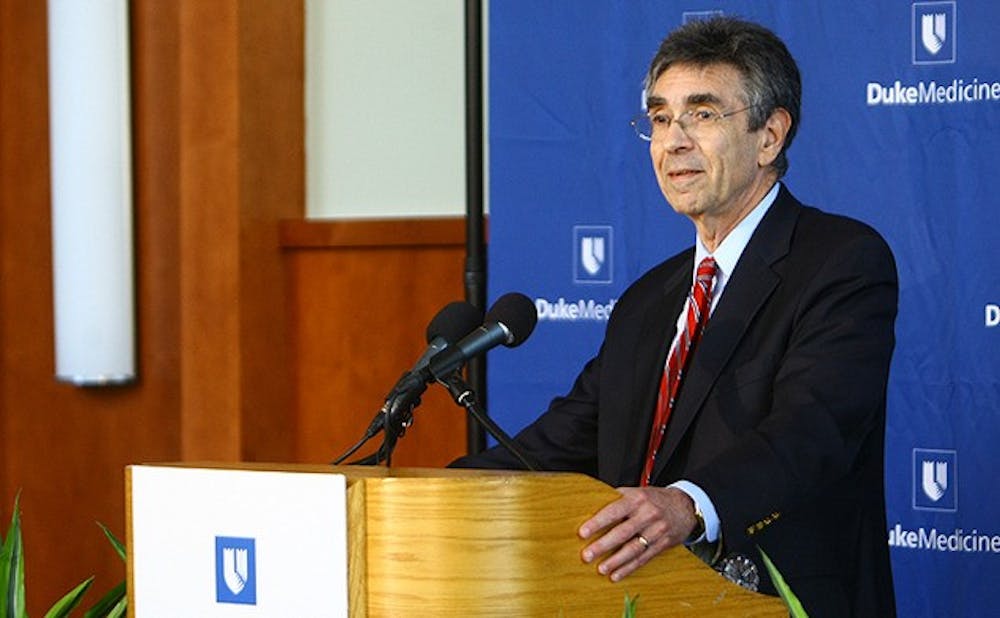Nobel Laureate Dr. Robert Lefkowitz leans back in his chair, propping his feet up on his desk and listening thoughtfully as his graduate students gave presentations on their latest research. His eggshell-colored walls are lined floor-to-ceiling with awards, with others sitting precariously on the edge of windowsills or lining his desk. Other knick-knacks find precious real estate in his office as well—a yellow rubber duck on his desk, a Blue Devil rug and his family calendar. And then there’s his Nobel Prize in chemistry.
Lefkowitz’s weekly lab meetings serve to guide his more than twenty graduate students and lab assistants in their quests to make groundbreaking research. Such a feat, however, is difficult to come by.
“As a graduate student, you need pain—no pain, no game,” he said in his thick Bronx accent to the postdoctoral fellows.
At his core, Lefkowitz, James B. Duke professor of medicine and professor of biochemistry and immunology, has always been a mentor. Although four decades of intensive research might push many academics out of the teaching world, Lefkowitz has always balanced his scientific pursuits and obligations as a teacher—a commitment he’s continued to uphold since winning the Nobel Prize last October for his studies of G-protein coupled receptors.
It might be hard to imagine, but Lefkowitz never wanted to become a researcher because of the failures he experienced when he did research at the National Institutes of Health.
In fact, the only reason he became a researcher at the NIH was to avoid being drafted for the Vietnam War. There were few opportunities for men to avoid the draft, but one did exist—getting a commission in the United States Public Health Service. Although these positions were hard to come by, Lefkowitz was able to grab one because he finished first in his class at the Columbia University’s College of Physicians and Surgeons.
“The first 18 months went very, very poorly,” he said of his time at the NIH. “It convinced me further that I wanted to do as little with research as possible. I hated it.”
As a child, Lefkowitz had always wanted to be a physician. Seeing his family doctor make such an impact on people’s lives inspired him to read science books so he could one day become a doctor too.
“He was a real role model for me. There was nothing I wanted to do more than be a practicing doctor,” he said. “The idea that you could learn science and then apply that to making people well seemed about the noblest calling one could have.”
Lefkowitz graduated from the Bronx High School of Science in 1959—which now has eight Nobel laureate alumni with Lefkowitz’s win. After attending medical school and conducting research at the NIH, he was ready to complete his residency and become a physician. It seemed as if research was behind him.
But after practicing medicine at Harvard University for three years, Lefkowitz realized he missed research. This realization came at the same time Duke offered him a job—one he was prepared to turn down. He made a list of demands Duke would have to fulfill in order for him to move down to Durham, demands that even Lefkowitz felt were “unmeetable.”
“They immediately agreed,” he said.
From there, he picked up where he left off at the NIH, researching receptors.
“When I started out, this whole idea of receptors was very controversial,” he said. “It wasn’t clear there was such a thing as a receptor.”
Lefkowitz would prove critics wrong. His research has led to major advancements in the development of prescription drugs, treating anything from common allergies to coronary disease. About 30 to 50 percent of pharmaceutical drugs on the market have been created on the basis of Lefkowitz’s research on G-protein coupled receptors.
Such advancements in the medical field led many to believe that he would win a Nobel Prize in medicine. In fact, a 2003 Herald Sun front-page article discussed how yet another year had passed without Lefkowitz winning the prize.
Last October, that all changed. A phone call at 5 a.m. from Stockholm, Sweden finally delivered the news many had been waiting to hear.
“My wife picked it up, but we have different recollections of what happened.... She claims she gently nudged me and handed me the phone while saying nothing,” Lefkowitz said. “I claim she gave me an elbow and said, ‘It’s for you, I think it’s Sweden,’ but she’s probably right.”
The news would come with a twist though. Lefkowitz did not win the Nobel Prize in medicine, but rather in chemistry. Even though he didn’t win in the area he expected to, he noted he took the news calmly.
“It just felt right,” he said.
Flash forward two months later, Lefkowitz was in Stockholm with his 14 paid-for guests to receive his prize.
“The Nobel Prize ceremony is akin to our Super Bowl ceremony—we’re on the front page every day [and] people ask for your autographs,” he said.
Fifty people came to Stockholm on their own dime to celebrate the affair with Lefkowitz even though only 14 guests could attend the official ceremony.
“Lots of students went to Stockholm to celebrate with him,” said Dr. Victor Dzau, chancellor for health affairs and president and CEO of the Duke University Health System. “That speaks a lot."
Dzau commended Lefkowitz on his ability to serve as a researcher, mentor and physician.
“[There are] 1,000 drugs based on his discovery,” Dzau said. “He’s such a great role model to anyone who has the aspiration the become a scientist and doctor.”
Get The Chronicle straight to your inbox
Signup for our weekly newsletter. Cancel at any time.

